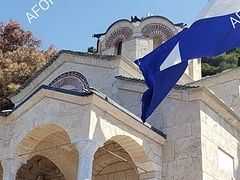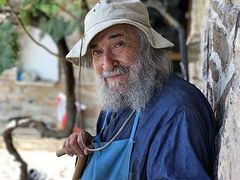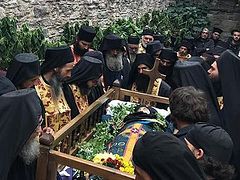Today marks one year since the departure to the Lord of Elder Gregory (Zumis), abbot of the Athonite Dochariou Monastery. The more the days pass, the brighter the image of the Elder emerges in the memories of those who passed through his school. We offer the story of a man who prefers to simply be known as Mαθητής (Mathetes).
 Elder Gregory and Fr. Isidore
Elder Gregory and Fr. Isidore
The first time I was in Dochariou, my spiritual father took me. The monastery wasn’t restored yet and was illuminated by kerosene lamps; and despite his many serious illnesses, Elder Gregory was full of strength. Every morning before obediences, the Elder gathered the pilgrims in the guest house and spoke with them for about an hour. I would like to describe one of these conversations, which revealed to me the theology of our Elder.
This morning, two young monks, theology students, came to the guest house. When the opportunity arose, they started to ask the Elder questions through Fr. Makarios who would translate. The conversation was full of academic terminology, and now I can’t even remember the contents of the talk.
But Fr. Gregory unexpectedly said to them: “You are adulterers and therefore cannot become priests.”
 Fr. Charalampios of Dochariou Monastery There was an awkward pause, but after a while the fathers tried to explain to the Elder that they had committed mortal sins under the influence of the antichrist ideology that had reigned in their country for a long time, for which they had repented and even received the tonsure.
Fr. Charalampios of Dochariou Monastery There was an awkward pause, but after a while the fathers tried to explain to the Elder that they had committed mortal sins under the influence of the antichrist ideology that had reigned in their country for a long time, for which they had repented and even received the tonsure.
Having heard them out, the Elder replied: “A priest preaches only one sermon his entire life: ‘Do everything as I do.’ But I see the mold planted in you by satan, and therefore, you can never say these words.”
But the fathers did not agree with the Elder and tried to tell him about the difficult situation in the post-soviet space, about the lack of clergy for the churches that were being reborn. The Elder quickly stood up, grabbed his staff, and leaving the guest house, said: “You are like those who purchase fiery Gehenna with their own gold.”
On the slopes surrounding Dochariou, there are about 3,000 olive trees, so the fathers and the other pilgrims and I spent two weeks on our knees gathering the olives, and at night we went to the Divine services. Of course it was difficult, but the sight of how the elderly fathers and even old Fr. Charalampos worked on par with me, after standing all night in the stasidia, added strength to my fight with inner protests.
I remember my first day gathering olives. Fr. Seraphim hadn’t even managed to explain to me the specifics of this work, which was new to me, when I received a stick upside the head from the Elder.
Geronda was indignant: “It all begins with conversations, turns into friendship, and ends with a complete breakdown of the monastic life.”
My idealistic view of life in the Athonite monastery—one of dignity, peace and mutual friendship—faded away like smoke over my two weeks of obediences.
But a real temptation for me was daily communication with the Elder. Every morning, up to fifty pilgrims would gather in the guest house for conversations with Geronda Gregory, and every day, several of them would leave red-faced with shame. Every morning, I was as if transported to apostolic times, when the Church was filled with those speaking in tongues and prophesying. It’s uncomfortable for me to write here about what I saw and heard, although it all happened in front of a multitude of witnesses—it’s not a secret confession. The realization that the darkness of my soul had lost its impenetrability became a serious test for my psyche.
My spiritual father always repeats that solid spiritual food is not for everyone, and that neophytes should start with milk. Two weeks later, my spiritual father and I, despite the offer to make a real monk out of me and the violent storm going on, ordered a small motor boat and set off for Ouranoupolis. My spiritual father flew to his native Donskoy Monastery in Moscow, to clean the periodically-clogged sewer, and I went to study in Europe.
 Pascha in Dochariou Monastery
Pascha in Dochariou Monastery
Perhaps remembering my crushing defeat during my first visit to Dochariou, my spiritual father fed me milk, explaining that I was unnecessarily embarrassed by the troubles that befell me and by human rebellions.
“The evil one paints pictures of well-being in your heart, but the path of every Christian leads to Golgotha,” he said.
And when I asked him one time how I could know that the Lord hears my prayers, he answered: “When your heart weeps, Christ hears you.”
I tried to hold these words in my heart for several years, and they interpreted this homily of Elder Gregory for me.
 Returning to the monastery barely alive, the Elder himself went out to do construction a few days later
Returning to the monastery barely alive, the Elder himself went out to do construction a few days later
After graduating, with the blessing of my spiritual father, I went to Dochariou again. The reconstruction in the monastery was in full swing, and our Elder’s health was really faltering. Both his kidneys had failed and he was in the hospital. When they brought him to the monastery in 2012, the old monks wept at how he looked. But every time he returned from the hospital after another complication, within a few days the Elder would rise up like a phoenix to continue his only sermon:
“Do everything as I do.”
He preached the Crucified Christ to us every minute. Geronda couldn’t see very well and had serious pain in his legs, but leaning on his staff, he could stand through an entire night service, and then in the afternoon, having barely reached us where we were pouring concrete, with two staves in hand, he would stand in the cement dust until evening. How many times I plopped down in the stasidia, exhausted then after lifting up my eyes and seeing the Elder standing in the altar, I would get up with shame. Ascending Golgotha, Geronda himself pulled all the brethren along behind him, and I don’t recall a single one he neglected.
The Elder was a man who crushed our hearts and taught them to weep for twenty hours a day. Concrete work in Dochariou was true servitude, from sunrise to sunset, running under the constant cry of the Elder. Four hours of sleep, leg cramps, services until morning, trapeza with icy spring water, and again—wheelbarrows with concrete or heavy rocks, and hearts pounding from the grueling labor. Work on feast days, work on Sundays… Geronda, turning from an infirm old man into a frenzied pirate, humbling both the laborer and the monastery’s father-confessor alike, but all the while boldly promising:
“The Lord will have mercy upon you for your crippled hands.”
 Fr. Sison from Dochariou Monastery
Fr. Sison from Dochariou Monastery
It was very hard physically, but even harder morally—not to be offended by the person humbling you. But, having seen real life examples of fathers who made the Elder give up on them and were then carried away by demons into the dark abyss, I would go to Fr. Gregory’s cell every evening and take his blessing. When I told Geronda in confession that I was only able to overcome all my resentments against him by evening, he answered, “If you don’t manage to forgive someone everything within five minutes, then you’re demon-possessed.”
Once, after obediences, Fr. Sisoes asked me to help him with some stone masonry. Two other fathers also came—Ephraim and Isidore. We worked at night, and not fearing the Elder, we spoke with Fr. Isidore, comparing the works of Archimandrite Sophrony (Sakharov) with the Gospel. At three in the morning, we went to church straight from our obedience, and after the service—to the trapeza.
During trapeza, the Elder said: “Orthodoxy knows neither Sophronology nor Paisiology, nor Porphyrology, but I want to remind you about the Samaritan Woman, whom the wisdom of the prophets enabled to see Christ. Read the Sacred Scriptures.”
Geronda’s theology was pure and sober. For example, he was very cautious about the wide distribution of ascetic literature. Himself being a true ascetic and man of prayer, and having the venerable Philotheos and Amphilochios as his teachers, he would warn about the danger of concentrating one’s attention only on acquiring the habit and fruits of prayer. The Elder told us that the podvig of prayer must begin with the crushing of our hearts of stone that are overflowing with passions, so that at the end of our lives, despite acquiring the habit of prayer, we won’t suffer a catastrophe the consequences of which cannot be eliminated in the little time we have left.
Indeed, Dochariou is markedly different from the other Athonite monasteries and sketes—and not only by the laborious obediences. You don’t see workers and monks walking around saying the Jesus Prayer orally, and it’s even difficult to find a monk with a prayer rope outside his cell.
 Fr. Amphilochios of Dochariou Monastery I spoke with Geronda about prayer three times. The first time was when an elderly monk approached me during a service and said: “How can you pray and not listen to this delightful Byzantine chant?”
Fr. Amphilochios of Dochariou Monastery I spoke with Geronda about prayer three times. The first time was when an elderly monk approached me during a service and said: “How can you pray and not listen to this delightful Byzantine chant?”
I asked Fr. Martirius, a translator, to go see the Elder with me. To my question of whether we should pray during the services, Geronda answered that we must pray always and everywhere; if you want to do prostrations, don’t be embarrassed and don’t be shy—it’s the same if you are streaming tears.
The second time I spoke with Geronda about prayer was when I received a text message on a cell phone I had concealed from the Elder… The message upset me so much that I couldn’t do anything right for several days. When Fr. Martirius translated for the Elder what happened, he began to groan: “Oi yoi yoi, how could you?! Look, I have numerous spiritual children on the mainland, and I can’t leave them without help, but every time I talk with them on the phone (the Elder had a landline phone in his cell), prayer leaves me.”
And the third time, the Elder himself came and chastised me (I had thrown some half-eaten noodles in the garbage): “You did a very bad thing for your prayer.”
The Elder again returned to what happened in the morning at trapeza: “We needn’t peep through the keyhole to see if someone is praying. He who has prayer loves everyone around himself, every plant, every rock and noodle; he would never throw it in the sop!”
A few months later, the monastery doctor, Fr. Ephraim, again reminded me of what happened, but in this way: “You remember what the Elder said about noodles? He said it about me.”
 Geronda Gregory at the construction site The Elder would be transformed while serving the Liturgy: Before you stood a defenseless child, chalice in hand—such a sermon of meekness is impossible to fake. When I managed to stand in the stasidia behind the abbot’s seat instead of Fr. Ioannicius during the services, I always smelled the sweet fragrance emanating from Geronda. The first time was after I communed, and I turned away from the chalice, as we do in our churches, and went to wash it down with blessed water. Only a month later did the Elder come up to me at the construction site and quietly whisper: “After Communion, we don’t turn our backs on Christ.”
Geronda Gregory at the construction site The Elder would be transformed while serving the Liturgy: Before you stood a defenseless child, chalice in hand—such a sermon of meekness is impossible to fake. When I managed to stand in the stasidia behind the abbot’s seat instead of Fr. Ioannicius during the services, I always smelled the sweet fragrance emanating from Geronda. The first time was after I communed, and I turned away from the chalice, as we do in our churches, and went to wash it down with blessed water. Only a month later did the Elder come up to me at the construction site and quietly whisper: “After Communion, we don’t turn our backs on Christ.”
For many on the Holy Mountain and beyond, the Elder was a temptation and a stumbling block. The hermits who passed through Dochariou were tempted by the backbreaking labor that prevented them from praying; the zealots and patriots were tempted by the Elder’s refusal to “climb onto the barricades” for the purity of the Church; the monasteries were tempted by the Elder’s statements about how the money of the British royal family is disastrous for Athos; the Prime Minister of Greece and the British Prince, whom Geronda didn’t allow into his Dochariou, were probably tempted; the Patriarch of Constantinople was tempted when he asked, “Why did the Elder recruit these Russians,” and the Elder got up and left, saying on the way out, “How can I not receive those whom the Theotokos sent?” and despite the ban from the Patriarch, not long before his repose he tonsured his last Russian monk—Fr. Kirinos.
Our Geronda was a good tree, bearing good fruit. I remember the inhabitants of Dochariou…
Fr. Amphilochios is the brethren’s confessor, who’s been with the Elder since childhood. He is a true preacher of humility, whose prayers work miracles. When you look at Fr. Amphilochios, passing through the church, crossing himself and venerating the icons, you immediately realize how proudly you walked and crossed yourself in church and venerated the icons with a sense of personal dignity all this time. So many times I asked him questions and received the same answer: “What can I know? My Elder is still alive.”1
And every time he had the need, he would run up the mountain to the monastery, to ask his geronda about this or that.
 Fr. Chariton from Dochariou Fr. Chariton is an ascetic and man of prayer. I remember, about ten years ago, a friend of mine who is an atheist, the vice dean of a European university, decided to get another grant to work on Mt. Athos. For the first time in his life, he went into the Orthodox Church of the Holy Angels in Dochariou and stood in the stasidia. Fr. Chariton was serving that day. He was censing the church, and when he reached the stasidia this researcher was standing in, the latter broke down and began to cry. Fr. Chariton was a living homily on humility and repentance, the existence of which my European educated companion didn’t even suspect. He was later baptized in Dochariou and even lived there for a while.
Fr. Chariton from Dochariou Fr. Chariton is an ascetic and man of prayer. I remember, about ten years ago, a friend of mine who is an atheist, the vice dean of a European university, decided to get another grant to work on Mt. Athos. For the first time in his life, he went into the Orthodox Church of the Holy Angels in Dochariou and stood in the stasidia. Fr. Chariton was serving that day. He was censing the church, and when he reached the stasidia this researcher was standing in, the latter broke down and began to cry. Fr. Chariton was a living homily on humility and repentance, the existence of which my European educated companion didn’t even suspect. He was later baptized in Dochariou and even lived there for a while.
There was Fr. Theologos, of whom it could be said: “Here is a Greek, in whom there is no guile” (cf. Jn. 1:47). When he would sing at the services after heavy obediences, it was he who sang most soberly on the Holy Mountain.
I’m not worried about harming the brethren with my praise, writing about them this way—they, like their elder, don’t surf the internet.
 The wall, manually filled in one day
The wall, manually filled in one day
When the end of my time for defending my doctorate was drawing near, I went to Geronda and asked his blessing to go to the school, but the Elder answered: “Stay in the monastery. Here at the construction site, with a wheelbarrow in your hands, you’ll write your doctorate and the Lord will give you a grade.”
But a while later, he asked me to order a chandelier from the Bohemian factory for the Dochariou wonderworking icon of the Mother of God, “She Who is Quick to Hear,” and I went to the university. A week later I began to help at the construction site—so much so that at night I would sit down to drink some tea, and in the morning I would open my eyes to find cold tea in my hand. I didn’t go back to the university. I defended my dissertation with a wheelbarrow in my hands, as my Elder said, and it couldn’t be otherwise.
The Dochariou we knew was our Elder. I believe that he, just like before, will defend his monastery and not leave any of us without his help.
1 Fr. Amphilochios was chosen to replace Elder Gregory as abbot. See: http://orthochristian.com/117716.html.—Trans.






